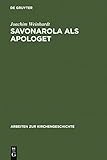Savonarola als Apologet : Der Versuch einer empirischen Begründung des christlichen Glaubens in der Zeit der Renaissance / Joachim Weinhardt.
Material type: TextSeries: Arbeiten zur Kirchengeschichte ; 83Publisher: Berlin ; Boston : De Gruyter, [2011]Copyright date: ©2003Edition: Reprint 2010Description: 1 online resource (296 p.)Content type:
TextSeries: Arbeiten zur Kirchengeschichte ; 83Publisher: Berlin ; Boston : De Gruyter, [2011]Copyright date: ©2003Edition: Reprint 2010Description: 1 online resource (296 p.)Content type: - 9783110175226
- 9783110896404
- 230.6
- B785.S34
- online - DeGruyter
- Issued also in print.
| Item type | Current library | Call number | URL | Status | Notes | Barcode | |
|---|---|---|---|---|---|---|---|
 eBook
eBook
|
Biblioteca "Angelicum" Pont. Univ. S.Tommaso d'Aquino Nuvola online | online - DeGruyter (Browse shelf(Opens below)) | Online access | Not for loan (Accesso limitato) | Accesso per gli utenti autorizzati / Access for authorized users | (dgr)9783110896404 |
Habilitation Universität Tübingen 2001.
Frontmatter -- Kapitel I: Einleitung -- Kapitel II: Zur Forschungs- und Wirkungsgeschichte im 19. und 20. Jahrhundert -- Kapitel III: Savonarola als Apologet -- Kapitel IV: Apologetik, Prophetie und die Einheit von Savonarolas Lebenswerk -- Literatur -- Personenregister
restricted access online access with authorization star
http://purl.org/coar/access_right/c_16ec
Savonarola (1452-1498) hat sich als vordringlichste, bislang kaum beachtete Aufgabe die Begründung der Wahrheit des Christentums gestellt. In seiner Jugend selbst in der Versuchung, das katholische Christentum mit einer neuepikureischen Weltanschauung zu vertauschen, sucht er zeitlebens Argumente für die Wahrheit des Glaubens. Im Anschluss an den aristotelischen Empirismus und in Parallele zur naturwissenschaftlichen Methode versucht er einen Induktionsbeweis für die Wahrheit des Christentums: Die Beobachtung des ethischen Verhaltens der Christen und die kausale Analyse dieser Wahrnehmungsdaten sollen den Schluss ermöglichen, dass der solches Verhalten motivierende Glaube wahr sei.
Savonarola (1452-1498) saw it as his highest priority to substantiate Christianity's claim to truth, an aspect that has hitherto found scant attention. Although in his youth he had himself been tempted to exchange Catholic Christianity for a neo-Epicurean view of the world, he spent his whole life seeking arguments for the truth of the faith. Following from Aristotelian empiricism and the lines of scientific enquiry, he attempts at an inductive proof for the truth of Christianity with the argument that the observation of Christians' ethical conduct and the causal analysis of these perceptual data allows one to conclude that the faith motivating such behaviour is true.
Issued also in print.
Mode of access: Internet via World Wide Web.
In German.
Description based on online resource; title from PDF title page (publisher's Web site, viewed 28. Feb 2023)


